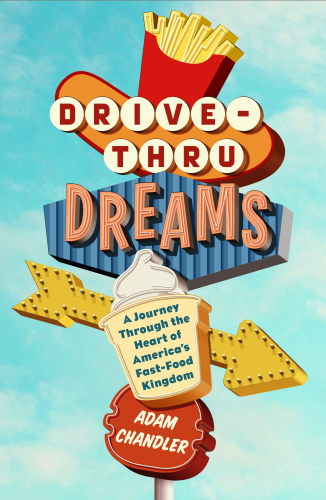
Drive-Thru Dreams
A Journey Through the Heart of America's Fast-Food Kingdom
کتاب های مرتبط
- اطلاعات
- نقد و بررسی
- دیدگاه کاربران
نقد و بررسی

April 29, 2019
Everybody, “no matter how refined the palate or how anointed the social status,” has a fast food pleasure, freelance writer Chandler states in his perceptive cultural history of the restaurants he identifies as a quintessentially American innovation. The book begins in a flurry of vivid portraiture of the genre’s titanic innovators. These tales of larger-than-life individuals—including the cussing-and-cooking “ham who served chicken” caricature Harlan Sanders (Kentucky Fried Chicken) and the famously “cruel” yet meticulously meritocratic Ray Kroc (McDonald’s)—start as glorious capitalist pirate tales but end with those idiosyncratic visions being “swallowed up by the burgeoning corporate state.” Chandler shows how the democratic spread of cheap, fast food reflects different periods in American history, from the prewar Upton Sinclair–inspired push for clean industrialized dining, to the postwar sprawl of prosperous highway-linked suburbs, and ultimately to the current divide over “interpretations of purity” in what constitutes healthy fast food. He throws cold water on the idea that “fast casual” eateries such as Chipotle are anything new, pointing out that their clean-looking aesthetic just harkens back to the industrial appeal of hamburger restaurants such as White Castle. This fun, argumentative, and frequently surprising pop history of American fast food will thrill and educate food lovers of all speeds.

June 7, 2019
According to a 2013 Gallup poll, Americans visit fast food restaurants at least once a month, making them one of the most popular destinations in daily life. While some may shake their heads at this fact, former Atlantic staff writer Chandler embraces it. The author has covered food, culture, and politics for the New York Times, Slate, and the Wall Street Journal. His first book examines American culture and its global spread over the past century through our relationship with food, specifically fast food. Tracing the history of and socioeconomic factors around this type of eating, Chandler discusses ways in which these restaurants become integrated into their communities, providing physical spaces for customers as well as reflecting local tastes. The author draws on personal reflections, as well as interviews with various people, from a McDonald's employee in small-town Iowa to food writer Michael Pollan (In Defense of Food). The conversational tone is supported with a hearty notes section. VERDICT Recommended for popular culture and behavioral economics readers.--Meagan Storey, Virginia Beach
Copyright 2019 Library Journal, LLC Used with permission.

Starred review from May 1, 2019
Ubiquitous though fast food restaurants have become across the American landscape, their popularity doesn't shield them from opprobrium from nutritionists and other detractors, who blame these establishments for a host of ills from America's obesity health crisis to the destruction of landscapes and even the general decline of table manners. But before anyone casts judgment upon fast food, Chandler asks readers to take a much closer look at all the outcomes and influences of this industry, how these businesses both provide employment and act as equalizing venues of social interaction. Fast food's transformative power extends worldwide, to the point that KFC has turned Christmas into a major holiday in non-Christian Japan. White Castle, the original burger joint, was founded in part to deflect Americans' wariness of ground meat after the revelations of Upton Sinclair's The Jungle (1904). In Chandler's version of the narrative, these corporate behemoths are still made up of people. He shares a host of anecdotes about some ever-fascinating individuals, from servers to CEO's?perhaps most notably in the tale of delicious vengeance by Aslam Khan, once spurned for a job at Church's Fried Chicken and later hired as an executive for the company.(Reprinted with permission of Booklist, copyright 2019, American Library Association.)

























دیدگاه کاربران